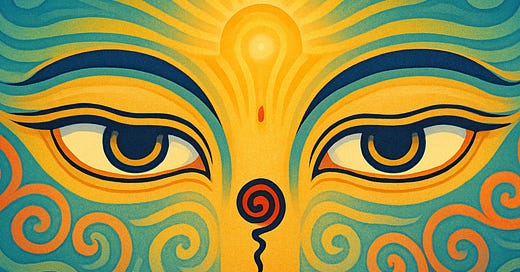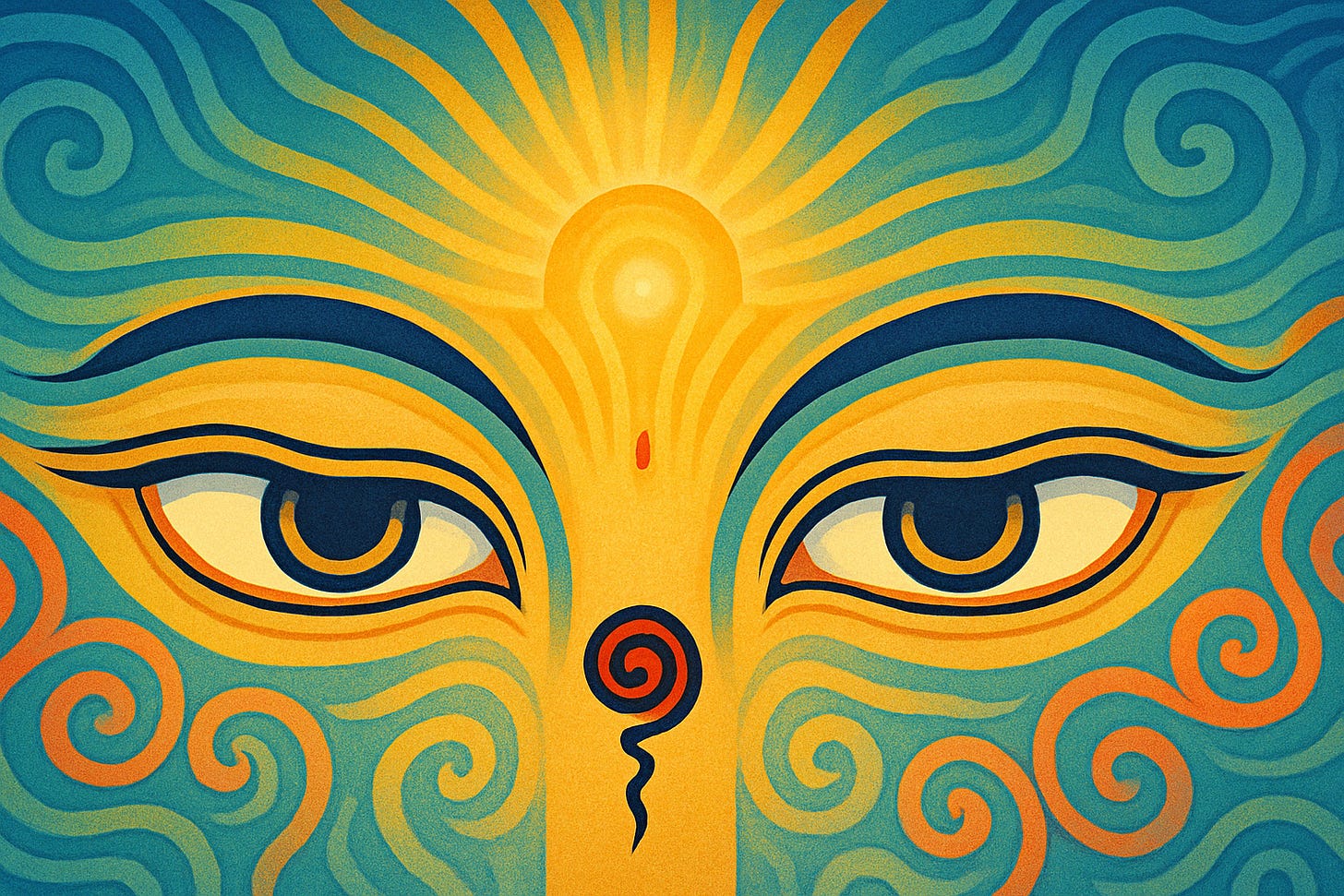Comparative Meditation Course starts next week! Learn more and sign up here!
This week’s livestream on The Existential Crisis: Personal and Collective is here:
(I think I will pause the live streams while I do my comparative meditation course, and that will give me some time to get a better livestream setup as it’s still a little choppy.)
Last week I wrote the first part of this piece exploring why awakening is important (it helps us understand how we can guide our development towards less suffering and more clarity and wisdom), and I started to discuss some qualities of awakened awareness (Non-Duality, Non-Judgement, and Natural Perfection).
In this piece I’m further exploring qualities of awakening, with a focus on The Three Characteristics (Suffering, No-Self, and Impermanence). The Buddha taught that these are three qualities of reality that we don’t perceive accurately, and Vipassana or Insight Meditation emphasizes examining our experience to better see the truth of these things, helping to liberate us from ignorance.
Qualities of Awakening: Freedom from Attachment and Suffering
“If you let go a little, you will find a little peace. If you let go a lot, you will find a lot of peace. If you let go absolutely, you will find absolute peace and tranquility.” -Ajahn Chah
When the Buddha was growing up in India, the dominant spiritual doctrine essentially taught that desire was the cause of suffering. But the Buddha brought about a more nuanced understanding into the cause of suffering; that suffering is in fact cause by attachment.
It may seem like a small shift in understanding, but the practice and implications were quite radical. We don’t need to give up the things we enjoy, we just need to let go of our attachment to them.
Buddhism is often called The Middle Way because it is midway between indulging in desire and giving up our seeking for desire completely. The Buddha essentially said we can enjoy life, we should just be very clear about the true nature of things and not get attached.
We shouldn’t fixate so much on avoiding suffering, and instead accept it as a fact of life. We should strive to embrace life fully, take the good with the bad, and not have any expectations or entitlement about feeling good or having a comfortable life.
You see the Buddha realized that it’s the nature of our minds to avoid discomfort and seek comfort or pleasure. Our mind gets ideas about what will make us happy, and we’re inevitably let down when things don’t work out as we had hoped.
Fixating on some future idea of what we want robs us from the fullness of this moment, right now. And this moment is rich beyond our imagination, if we can only really be open to it.
“The moment we want to be something we are no longer free." -Krishnamurti
When we let go of attachment, we find ourselves more free and suffering less. We can also be more open to life, welcoming our experience in its fullness instead of trying to negotiate each moment.
The Buddha taught that the more we resist suffering, the more we suffer. It is actually the full embrace of each moment, including and especially the difficult ones, that liberate us. (This is the principle of equanimity, a topic I discuss a lot.)
“We have tried everything to get rid of suffering. We have gone everywhere to get rid of suffering. We have bought everything to get rid of it. We have ingested everything to get rid of it. Finally, when one has tried enough, there arises the possibility of spiritual maturity with the willingness to stop the futile attempt to get rid of it and, instead, to actually experience suffering. In that momentous instant, there is the realization of that which is beyond suffering, of that which is untouched by suffering. There is the realization of who one truly is." -Gangaji
Qualities of Awakening: No-Self
“There is no such thing as a person. There are only restrictions and limitations. The sum total of these defines the person. You think you know yourself when you know what you are. But you never know who you are. The person merely appears to be, like the space within the pot appears to have the shape and volume and smell of the pot. See that you are not what you believe yourself to be. Fight with all the strength at your disposal against the idea that you are nameable and describable. You are not.”
-Sri Nisargadatta Maharaj
No-Self is one of the most misunderstood teachings of Buddhism. To claim that you don’t exist seems pretty nonsensical, and yet there’s something to this claim.
Vipassana teacher Daniel Ingram points out that the actual claim in Buddhist texts isn’t so much that you don’t exist, it’s more so that the sense of self we naturally develop is a fabrication, and the reality of who or what we really are is not accurately perceived.
We essentially develop our sense of self based on identification with thoughts, feelings, and our environment. But these are simply limitations we develop, patterns of thinking and feeling that confine our awareness.
Through careful observation we start to see that we are not these patterns of thinking and feeling. Instead, we are the awareness in which all of these patterns are happening.
In our regular state we unconsciously repeat patterns, and these become the limits of our perception. Through meditation and mindfulness practice we start to observe these patterns, and as a result they naturally soften. We start to see beyond these patterns, no longer identifying with the patterns themselves.
We see that our essential nature is not our habits, and instead realize the only thing about us that is truly consistent, that is in fact indestructible, is the awareness itself. And awareness has no form, no limitation, no beginning or end.
The more we realize that we are our awareness, as opposed to the contents of our awareness (what we are aware of), the more we liberate ourselves from the limitations of the ordinary sense of self.
Qualities of Awakening: Impermanence
"It is not impermanence that makes us suffer. What makes us suffer is wanting things to be permanent when they are not." ~ Thich Nhat Hanh
Impermanence, as taught in Buddhism, has many dimensions.
In the big picture this means we die. This life is finite, and the contemplation of our death can help to bring more clarity regarding the importance and opportunity present in our lives.
In Buddhism it’s taught that being a human is a very precious opportunity to improve our karma and ultimately liberate ourselves from cyclical suffering. Contemplating our limited time as a human can help motivate us to make good use of our lives.
But impermanence is also talked about as a fundamental quality of each moment. That as we pay attention closely to our sensory experience, it becomes less solid, and we begin to enter more of a flow state in which we surrender to the ever-changing and groundless nature of existence.
“The bad news is you’re falling through the air, nothing to hang on to, no parachute. The good news is, there’s no ground.” -Chögyam Trungpa
There is something about our mind that wants to make things solid. We develop fixed perceptions of things, essentially projecting our expectations.
You can think about someone you know, and you may really feel like you know them as you’ve spent a good deal of time with them, but next time you see them they may be someone completely different.
Maybe you’ve been on the other end, where you’ve changed but old friends don’t recognize it, they still expect you to be the same person they knew you as.
And this projection doesn’t just happen with people, it happens with everything. Once you know the way to work, you don’t pay as much attention. You’re on autopilot during your commute, assuming that the route you took yesterday is the same one you’re taking today.
But nothing is ever the same. And our assumption that things are fixed, that this tree I walked by last week is the same tree I’m walking by now, it keeps us from actually paying attention. We no longer see what’s in front of us, instead we project our expectation, never really looking to take in the rich beauty of this moment.
“You can look at a flower without naming it, without bringing in all the associations you have about flowers. That is real seeing.” -Krishnamurti
Our mind has built a map of reality, a set of expectations based on past experiences, and we are constantly projecting these concepts onto our experience.
This keeps us stuck in our limited mind, never fully perceiving the rich alive ever-shifting nature of this moment.
This is in fact a well studied modern phenomena (I even found a series of cool Ted Talks about how our brain creates reality). But while western science has only discovered this recently, the Buddha not only pointed this out long ago, but taught about how to overcome these limitations of mind to perceive things more accurately; leading to a more immersive, satisfying, and liberating experience of moment to moment reality.
“Enlightenment is a destructive process. It has nothing to do with becoming better or being happier. Enlightenment is the crumbling away of untruth. It's seeing through the facade of pretence. It's the complete eradication of everything we imagined to be true.” -Adyashanti
Join me for a journey exploring the practices that help to dispel ignorance and lead to a more clear perception of moment to moment reality in my Comparative Meditation Course (starting next week!).





This is getting me even more excited for the Comparative Meditation course! 🧡